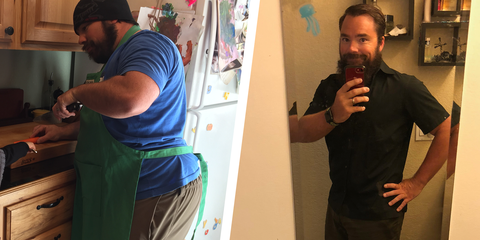
If anyone knows the power of a mile, it’s Jason Aberly. His mile-long runs quickly snowballed into a marathon — and he ended up losing almost 100 pounds in a little over a year.
The 38-year-old from Colorado used to plow through his 10,000 steps on hikes around his home state. But children and life in general started getting in the way, and one day, he just stopped. Another day passed, and another, and another, until those walks in the woods became a distant memory. As he completed fewer and fewer steps, Jason packed on the pounds until he hit his highest weight ever: 270 pounds.
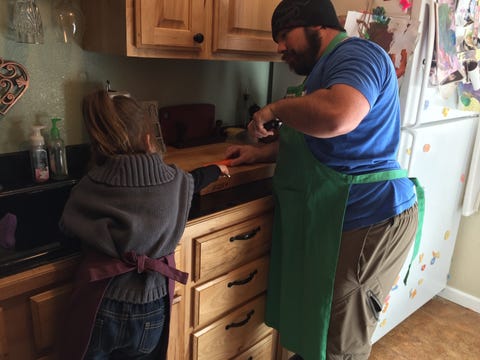
“I gained the weight just basically from living my life,” Aberly explained to MensHealth.com. As an EMT-turned-stay-at-home-dad to two young children, he took care of his kids and family, while letting his own fall by the wayside.
“One thing leads to another, and you’re 100 pounds overweight. It comes on so slowly that you just, you don’t even notice,” he said. It wasn’t until the day that he couldn’t pick up his son because his belly got in the way that Aberly knew he’d had enough.
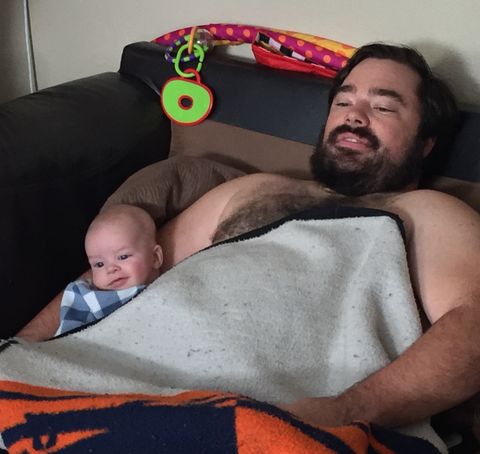
So, he took things one step at a time.
“I started off with a half mile out and a half mile back,” he said. “I started off a minute running and then two minutes walking. That’s the only way I could get it done. After two weeks, I would increase. I’d run to another landmark that I had been eyeballing, and gradually just increased.”
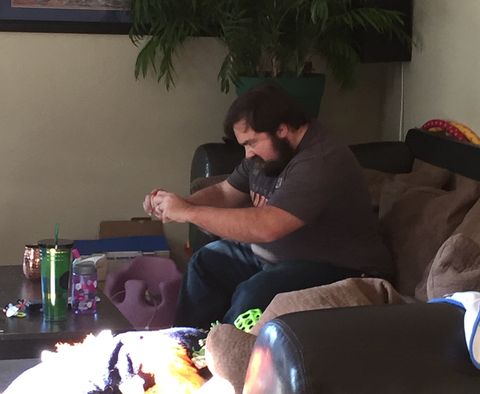
Aberly wasn’t alone in his health journey. His wife Amanda joined in, too, after seeing her husband’s progression. They weren’t focused on losing weight — they just wanted to get to the finish line.
Over Memorial Day Weekend in 2017, the couple ran the Bolder Boulder run, a 10-kilometer race. With that little taste of glory, they knew they had to keep going. (If you want to start running, check out MensHealth.com’s beginner’s guide to running.)
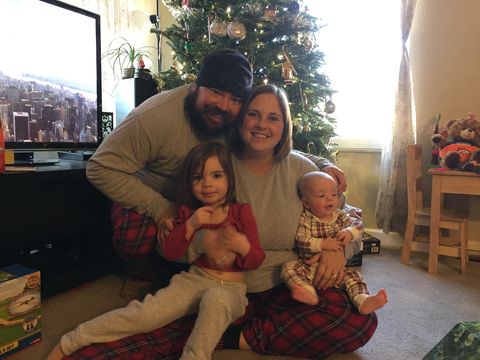
Aberly went on a quest to change up not only his diet, but his entire family’s. After listening to an episode of Joe Rogan’s “Joe Rogan Experience” podcast, Aberly became hooked on learning everything he could about the keto diet, an eating plan consisting of lots of fat and minimal carbs.
“I went up to my wife one day and was just like, ‘You know, I think I’m going to try keto.’ And to my surprise, she’s like, ‘I’ll do it with you,’” Aberly said, noting that her support is genuinely what helped him get through his weight loss journey.

Aberly began by eating traditional keto meals, including eggs with avocado for breakfast and bunless burgers for dinner. He then slowly introduced more vegetables to his life, which are still his only source of carbohydrates today. From there, Aberly accidentally stumbled upon intermittent fasting. One day, he forgot to eat breakfast and decided to give the 16-8 day a try, where you restrict your eating to an eight-hour daily window.
All of this has helped him achieve a 91-pound weight loss, and counting. Today, Aberly is down to 179 pounds.

To maintain his weight loss, Aberly sticks to a loose keto diet and tracks all of his meals using the MyFitnessPal app, tracking his calorie and macronutrient intake. He’s also training for his next big race: a half marathon and full marathon in 2019.
His wife Amanda is right there with him. She’s dropped 50 pounds, and continues to run by his side.

As for what he’d tell another dad who’s in his shoes?
“Don’t wait,” he said. “You’re gonna be this way for the rest of your life. If you start now, or if you start six months, it’s still going to be the same. You’re still going to be living with it. So even if you start mild — and no matter how slow — you’re still working towards something.”
Source: Read Full Article